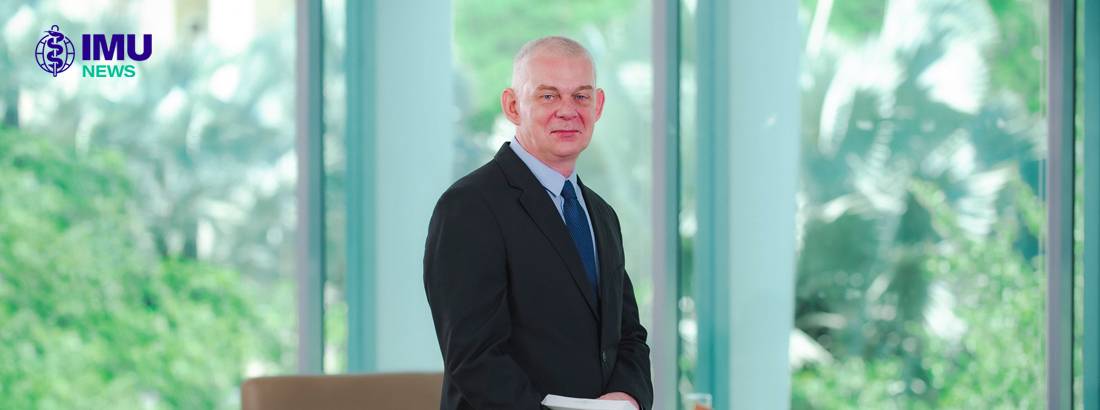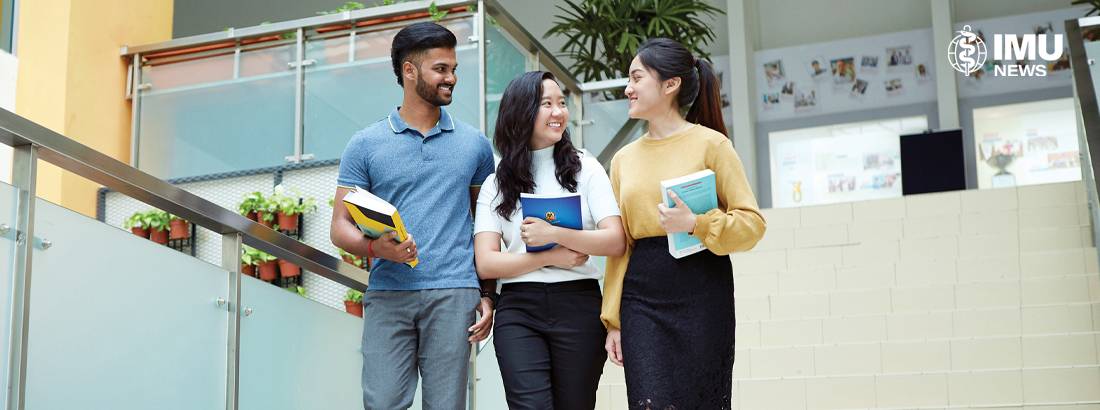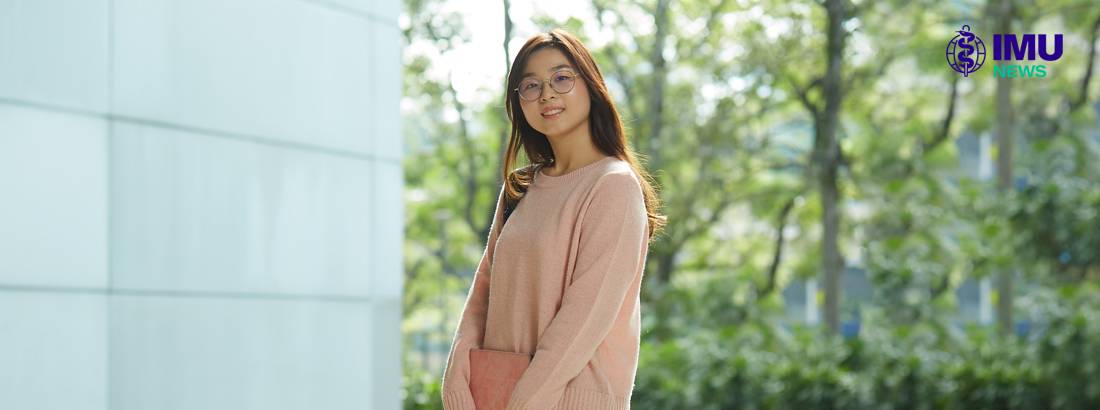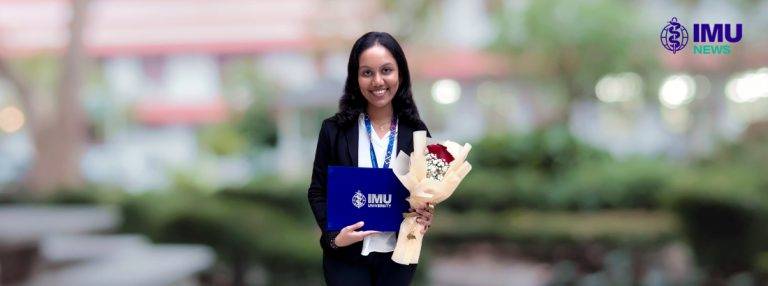What started as a gateway for students to move into science-based programmes at the IMU has since evolved into a centre that helps to build students of both science and non-science interests. Dr James Edward Walsh, Director, Centre for Pre-University, tells us about how the Centre is helping to ready its students for their future.
It’s not just an ordinary school. Students who join the Centre for Pre-University (CPU) at the IMU, almost become part of a family, inheriting a faculty that are as much academic counsellors as they are second parents. Dr James, CPU’s director explains that students entering the pre-university courses are young, typically 16 to 20 years old, who get a lot of support and mentoring, “sometimes bordering on parenting!” he says laughing.
It’s not something that he shies away from as when it comes to his students, it’s the interactions with them, and watching them grow that keeps him going. He enjoys being part of the change of mindset that students go through when they first enter the programme and are exposed to what university life is like. “It’s very rewarding to see them come out of their shells and learn to express themselves. I never tire of it,” he adds.
A Democratic Education
Dr James describes the centre as being a democratic place – catering to students of all academic levels and treating all students equally regardless of their background.
Part of making the centre accessible to more students will be the newly introduced Foundation in Arts (FiA) programme that will see its first intake in 2024. This programme joins the Foundation in Science (FiS) course that has been the mainstay of the CPU. As the name suggests, the FiS has been only open to students with science backgrounds, which equates to only a quarter of students who do the Sijil Pemeriksaan Malaysia (SPM), Malaysia’s local high school examination.
All of this changes with the start of the new foundation programme. With the welcoming of non-science students into its halls, the demographic profile of the school will open up. Dr James says: “We want to burst the bubble that if you didn’t do science in school, you’re somehow a lesser student. It’s just not true.”
As a perfect example, Dr James showcases the IMU’s current Group CEO Gerry George, a renowned business academic and academic institution manager worldwide . “He is the perfect example of how business studies can be just as cool as being a doctor,” he says. Dr James also wants to instil in arts stream students that they play an important complementary role to science and in particular medical disciplines. “Doctors cannot cure people if they don’t have business people on their team, people with economics, operations and communication skills expertise. In the 21st century, If there were only doctors and nurses in a hospital, the place would grind to a halt,” he says candidly.
Reframing Perspectives
A common challenge Dr James has encountered with students is the many times students have felt that if they didn’t make it as doctors, their whole lives were over. To this, he responds with an example of his own experience. Having attained a PhD in Physics many years ago in Ireland, he never thought that he would end up being a director of a centre at a medical university in Malaysia. He tells his students that education is a doorway that can bring you to many places – “if you use your imagination, and you’re tenacious, and your heart is in it.”
According to Dr James, while it is perfectly acceptable to veer from an original goal, it is still an expensive lesson, he feels. “So, from the start, we try to make sure they make the right decision,” he says, explaining that almost everyone who wants to be a doctor, dreams of a Hollywood-fuelled glamourous lifestyle. He warns though: “It’s really not like that.” This is where Dr James and his team lay out the realities of life as a doctor and ensure that students consider the many other paths from traditional alternative medicine to biomedical science; at times also guiding parents’ aspirations for their children.
Pathways at the IMU
While those who join the FiS have the established science and healthcare-based degree programmes to choose from at the IMU, for those in the non-science stream, other pathways are open to them within the University. These include the bachelor programmes in Business Administration, Digital Health and Psychology programmes. A FiA student can also take up Nursing provided they did science in secondary school.
Opening up the non-science stream under the centre has also meant greater flexibility for students. Dr James explains that about 20 percent of the modules for both foundation programmes are common. This includes subjects such as psychology, critical thinking skills and computing studies. This means that a student having started in one stream, can still transfer their credits to another if they feel they made the wrong choice.
Student-centric Decisions
Helping students see the different pathways open to them is crucial to the development of students at the CPU. This includes guiding students to figure out what they can do especially in times where their grades are falling and doors seem to be closing. “As academics, mentors and advisors, we need to show them how they can still get to their dreams,” he says, adding that while it may be a bit more complicated and take a little bit longer because their grades are lower, they can still get there.
While the environment is supportive, it doesn’t mean that Dr James doesn’t demand the best. If a student fails and wants to repeat a course, Dr James isn’t one to acquiesce unless there is real determination. Students have to discuss with their faculty mentors what they did wrong the first time, and what they’re going to do right the second time. “Mid-semester, if the grades are no better than the first time, I have to ask them to change their target degree course or withdraw from the course. I’m not going to take their money and let them make the same mistake twice,” he explains. Students of CPU, he adds, need to be prepared to embrace their mistakes, learn from them and then move on.
He does have one more demand for students: a good work ethic. He says: “I believe you have potential, so work hard. Turn off the PS5, stop watching Netflix and K-drama, and you’ll see how much better you can perform, but make sure you retain a good life balance throughout your studies.”
About Dr James
Having spent the last 12 years in Malaysia, Dr James enjoys the multicultural community. “I like to see cultures blending in at the university,” he says explaining that for some of his students, it’s the first time that they are in the same class with someone from a different ethnic background. “It’s great to see that those barriers being broken down.”
With his father and grandfather being doctors, he initially thought he would follow in their footsteps. As it turns out, he took up physics instead and life’s unexpected turns led him to Malaysia.
Dr James has been with the IMU since 2017, taking up the role of Head of the CPU, now Director. His previous work includes a stint at the Irish Embassy as its Education Attache and as a lecturer in a local private university. “I love working with students and mentoring them,” he says.





